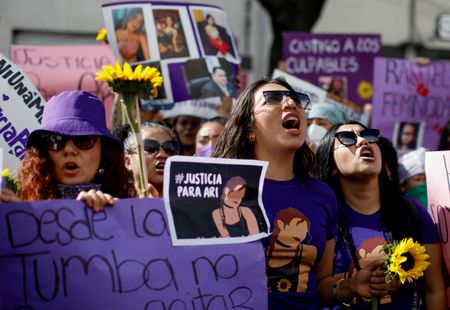By Sarah Morland
MEXICO CITY (Reuters) – Less than half of femicides in Mexico result in convictions, research group Impunidad Cero said on Thursday, pointing to a lack of resources directed at investigating the murder of women and girls.
The group said in a report that 43% of femicide cases over the past six years lead to convictions, while noting that only a minority of cases were investigated as femicides – the killing of a woman or girl because of her gender, a crime which carries harsher sentences.
Of more than 5,600 killings of women and girls recorded by authorities in the first nine months of this year, half were deemed manslaughter and 38% murder. The report found that conviction rates for murder, for both women and men, is just 7%.
Mexico has one of the highest murder rates in Latin America, a region that accounts for the highest rates worldwide, according to the group and U.N. data.
Monserrat Lopez, a data analyst at Impunidad Cero, told reporters a trend of militarization was sidelining civilian institutions responsible for investigating murder and femicide.
Juan Antonio Le Clercq, who conducts research into the problem of impunity at Puebla’s University of the Americas (UDLAP), said the budgets for state judicial offices averaged just 14.29 pesos ($0.75) per capita a year – aggravating a lack of public officials available to handle reports of crimes.
“I don’t know who is supposed to investigate these crimes,” he told a news conference to present the report.
Last week, parents of murdered women and girls marched in Mexico City to demand justice, with many saying their cases were not being adequately investigated or were dragging on for years.
Mexican states last year averaged about 10 prosecutors per 100,000 people, with on average just 13 police investigators and seven experts, Impunidad Cero said in its report.
With just over four judges per 100,000 people, Mexico would need 98 years at the current rate of increase to match Europe’s 23 judges per 100,000 people, Le Clercq said.
The State of Mexico, despite having less capacity for investigation, was imprisoning people at twice the average national rate – with many detainees unable to afford a lawyer, he added.
Impunidad Cero recommended institutions collaborate to develop better protocols and capacities to investigate gender violence, and develop social reintegration measures to prevent offenders from repeating crimes.
(Reporting by Sarah Morland; Editing by Robert Birsel)





